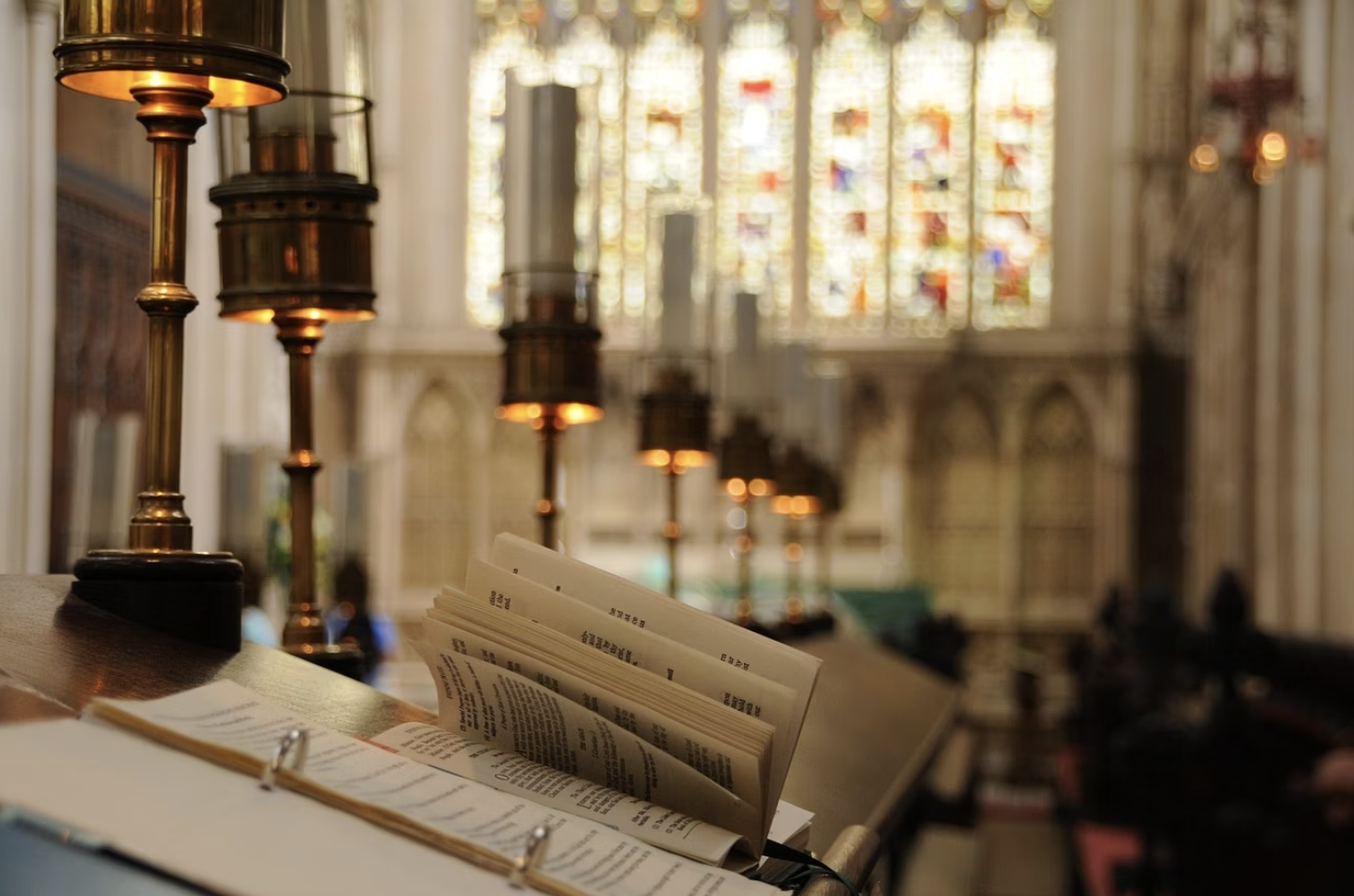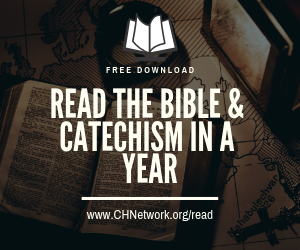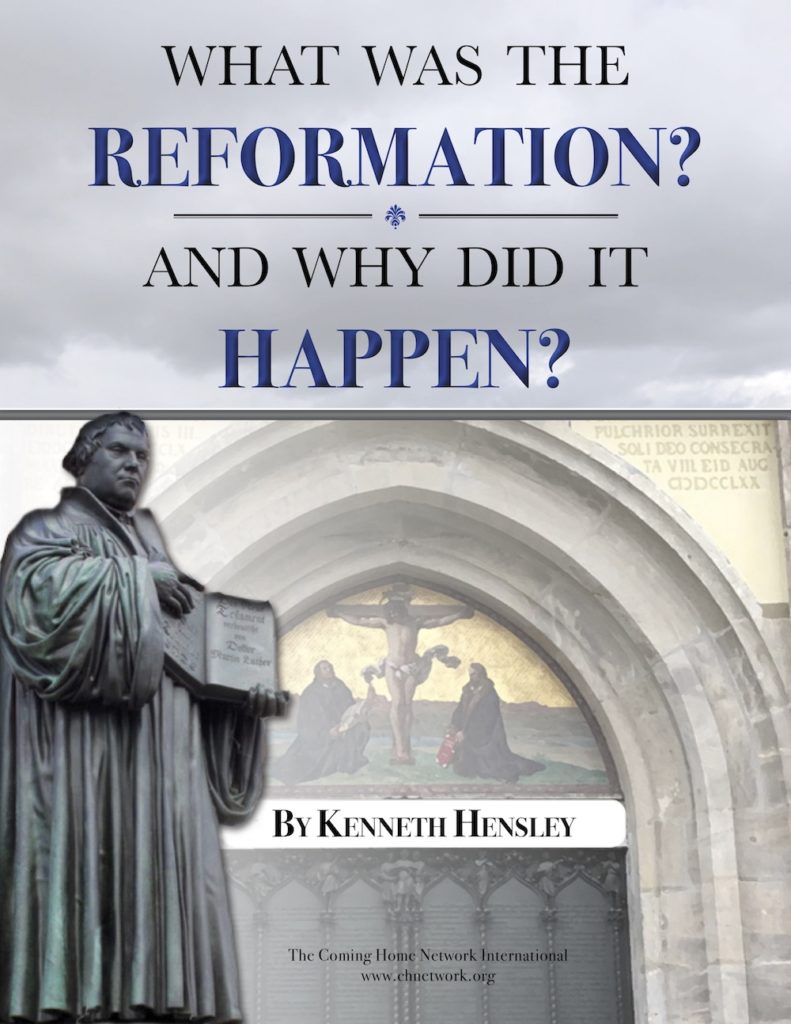
This written testimony originally appeared in the February 2024 CHNewsletter.
*****
I wrote this essay over a decade ago when I was in a very different phase of life. I’d given up my position as the pastor of a lovely little church on Cape Cod and relocated with my wife and three children to St. Louis. Here, we were received into the Church, and I began the process of being ordained to the priesthood. Even then, I was still feeling my way into the Catholic Church. At the time this essay was published at the website Called To Communion, it garnered a number of responses, one of which was the question of how I might feel in the future about the words I had written. Would I still feel happy to be Catholic?
I have to say, I feel the exact same today. I still find myself, even if I’m older and wearier in some ways, standing in wonder and awe before Christ and his Church. If anything, the enchantment has only increased. I’ve fallen even more in love with Christ. The only explanation for this spiritual growth is that the Holy Sacrifice of the Mass has pried open a door in my heart. I peer through and the world beyond is timeless and wide, filled with the glory of God. In some way, even though I’m still lingering somewhere between, as it were, the porch and the altar; and even though none of us will be home until we finally meet God face to face, at the Mass, embraced by the communion of saints, I am somehow, nevertheless, home.
“Hear yet my paradox: Love, when all is given, To see Thee I must see Thee, to love, love;
I must o’ertake Thee at once and under heaven. If I shall overtake Thee at last above.
You have your wish; enter these walls, one said: He is with you in the breaking of the bread.”– From The Half-Way House by Gerard Manley Hopkins
At Yale, there used to be an auxiliary library buried underneath the green in front of the Sterling Memorial Library. One fine fall day, I happened to find myself not out amongst the foliage but rather tucked away below the sunshine and the sod, reading a book. I suppose it was an odd choice. This was the ugliest space I know of on an otherwise beautiful campus. So ugly, in fact, that it was targeted for a remodel and is now gone. But there I was, and perhaps even more odd, I, a good Anglican- priest-in-training, was reading Cardinal Newman. Not the good parts that we Anglicans agreed with; the parts about the Oxford movement and the Church Fathers. No, I was reading the Apologia; the story of his conversion to the Catholic Church. I was particularly bothered by one specific bit. I was at the part where Newman makes his point that, fundamentally, there is no difference whatsoever between Arianism and Anglicanism. One is reviled and discredited, the other respectable and vital. But look closer, Newman argued, look underneath. What is there? Rebellion. There, buried beneath the sartorial splendor, the monarchy, the gorgeous liturgy, the incense, the polyphonic chant, and the prestige of Oxford was a group of Christians steeped in the bitter throes of willfulness. Yes, it is wrapped up in the respectable sounding doctrine of the Via Media, but of course, the Via Media is the last refuge of all theological scoundrels. Newman got to me that day, blinking in the fluorescent lights of a now disappeared world. My own world, comfortable as it had been, began to slip away as well.
Or perhaps it really slipped away the day I read the story of another convert, Gerard Manley Hopkins. This is the Hopkins who I am convinced could convert the world through his poetry if only we gave him our attention. “The world is charged with the grandeur of God,” indeed. But for Hopkins, this only became the case through his own participation in the mystical life of the Church. His poetry before his conversion he came to consider vain; worthy only of being burned (yes, he actually did burn all of his poetry). While still at Oxford, Hopkins saw the beauty of the Catholic Church and became determined to convert. In the intervening period, as all his friends and sometime prospective employers tried to talk him out of it, he wrote in his journal that he felt “like an exile.” I read those words and the Holy Spirit did His work and I understood that until I converted, I too would feel the pain of exile.
It had taken me a good bit of time to work my way to this point. I grew up a free-church Pentecostal of sorts. I never thought of myself as anti-Catholic. But in retrospect, goodness, was I anti-Catholic! The problem with Catholics, everybody knew, was that they worshiped statues. Nothing could be more clear. As a child, I simply assumed this to be the case. There were statues in their churches, none in mine, prima facie idolatry.
Sadly, this manner of thinking is implicit in Protestantism. I suppose it is the blindness that comes with rebellion; like Adam hiding from God in the garden because he had lost sight of the true Good. It isn’t necessarily our place to blame our separated brethren. After all, most didn’t choose to be born Protestants and be indoctrinated in the habit of divisiveness; but it certainly is our place to be patient with them and to pray for them, and when the occasion calls for it, to attest steadfastly to the truth of the teachings of the ancient Church.
I bring all this up because this was the position in which I found myself as a young college student. Dissatisfied with my own brand of the Christian religion which denied it was a religion and my own inherited tradition which denied it was a tradition, I thought briefly about Catholicism. I even went to Mass a few times. It was fascinating. I was attracted to it. I felt something solid about it, comforting, and yet, I knew for a fact that these people worshiped statues! Okay, with age, my critique became a bit more subtle. But in the long run, aren’t all our arguments against the Church just as silly and vain? She outlasts us all. We can kick and scream and throw tantrums; legislate against her, slander her, outlaw her priests and persecute her children: the Church still prevails. She fears nothing. And because of this, she is able to be generous and patient.
The greatest novel of all time (no one argue with me on this) is Brideshead Revisited by Evelyn Waugh. In it, Waugh describes a family who keep their country seat at Brideshead in the ancestral home. The family itself is a mixed lot—a father living abroad in sin, a domineering mother, a son who is a flamboyant dandy, a worldly daughter, and an overly-childlike daughter. Waugh describes the slow decline of Brideshead as the family disintegrates and scatters. This dissipation works itself out universally in the advent of the Great War, which finally swallows up all of England and turns Brideshead into quarters for Army command. In the end, though, we are left with a scene in the house’s private chapel, where the altar lamp is still lit and a lone priest says Mass for an old woman. I am a lot like that family. Many of us probably are.
You see, conversion is a gift. Mother Mary holds her Son for us, patiently suffering at the foot of the Cross. We can ignore her, go our own way, rebel—it doesn’t matter. Hanging on the Cross, Christ says to each and every one of us, “Behold your Mother.” She is here still. Waiting. We may be elsewhere, doing God knows what, but above the altar the candle still flickers. This is the light by which, in time, we find our way home.
As a young Pentecostal, I wasn’t yet ready for the Church, but She is patient. And so my story continues.
I became an Anglican. This was a place that seemed to have it all: dignity, beauty, wonderful music, good order, tradition, and of course, they didn’t worship statues. I don’t like the idea of tearing into the Anglican tradition as far as specifics go, so let’s be content with Newman’s fundamental insight. As nice as my sojourn in Anglicanism was, I began to feel a lack. It was like the Nothingness from Never-Ending Story (the scariest movie of all time, don’t fight me on this). It’s hard to explain; I just know that after a while my heart wasn’t in it. I was still wrestling every single, little belief I held. There was never any rest.
What was worse, having been taught that a good follower of Jesus always goes to His Holy Word for life-giving truth, I could not help but notice that the word of God speaks of something called “The Body of Christ.” This Body is identifiable; it consists of those who have been united with Christ through Baptism and have received the Holy Spirit for purposes of holiness and witness. It is ordered by the governance of Bishops, thus allowing orthodoxy to flourish and the ancient Gospel truth to be defended; as Paul advises Timothy, the Church is the “pillar and foundation of the faith.” (1Tim 3:15 NIV) The Body of Christ is the Church, visibly united, gathered around the crucified and risen Lord, and fed by Him in the Sacrament of the Eucharist. This is the way in which Christ is present to His people. He is, of course, not confined to simply being present in the Communion feast but this is His chosen way, a marked moment, if you will, by which all other moments are defined. If Christ is potentially present in this world in any place, it is because He is first present in the Eucharist. This is why He says “unless you eat of my flesh and drink of my blood, you have no life in you.” He is our sustenance. He is our all. So, as Church, we are called to visibly gather around the Lord’s altar to give thanks and to be fed. This is not just a mysterious, ancient rite. It is the redemption of the world.
You can see the problem here, right? I was on the outside looking in.
In a real sense the Church has become fractured. We no longer gather around the table as the One Body. To me, this means much more than an organizational difficulty. This means that we have presented to the world a scandal. We have divided up the Body of Christ. We have protested against each other, separated ourselves, held our doing God knows own judgment up against that of the Spirit-inspired Church. A close reader of the Bible will come to the conclusion that what, but above Christ and his Church, the Head and the the altar the candle Body, are inseparable. And yet, in our practice, we pretend that this is not the case.
It is a big deal, a really big deal, for Christians to hold themselves apart from visible communion. We might all protest from our various theological kingdoms that we aren’t the ones who have gotten it wrong. We are not to blame. Perhaps not. Or perhaps all of us in every corner of Christendom are to blame. No one gets off easy with this one.
Ultimately, my goal is not to point the finger at others but to examine my own conscience. Had I held myself apart from visible communion with the Catholic Church because I thought I knew better? The answer is, yes, I had. My journey towards the Catholic faith has not, at its core, been a journey of personal enlightenment or one in which I have held up the Church to my own opinions and finally found it acceptable. This would be to make the Church too small, and as G.K. Chesterton reminds us, the Church is ever so much larger on the inside than it seems from the outside. Mine has been a journey towards faith. I have learned to believe first so that I might later begin to understand, rather than understand so that I might then believe. My intellect simply isn’t up to the challenge that the latter option presents. I trust that when Jesus breathed His Holy Spirit into His disciples He was anointing His Church to be, among other things, the guardian of the sacred and simple truth of the Gospel.
I have learned to rest in the truth that the Church teaches. I do not make my own salvation through knowledge or emotional experiences, through following this teacher or that. Whether I realize it or not, God is doing a great work in me. It was begun at the Cross, is sustained by the Holy Spirit, and will be completed at the final judgment.
I borrow this analogy from the English poet and convert John Dryden, but it fits me. In the Aeneid, Virgil writes about an encounter that Aeneas has in the forest outside of Carthage. He has wandered there after losing many of his men at sea during a storm. In the forest, a woman approaches him, falls into conversation with him, and comforts him in the midst of his troubles. It is only after she turns and walks away that he recognizes her. It is his mother. He recognizes her by the way that she walks.
I am sure that I could put up a good fight on all of the various theological and biblical reasons why I believe in the Catholic Church, but I would really prefer to say simply that the visible, undivided Church, the Church that Jesus prayed for in His last moments with His disciples, the Church that is the Mother of us all not on her own merits but because she holds Christ within her womb; this I have recognized by the way that she walks.
Even though I’m making a bit of an attempt, this is not the kind of thing that one explains between the soup and dessert course while at dinner. At least this is what Newman once said when asked “why become Catholic?” It is a deeply personal and intimate spiritual journey. It is the search for one’s mother. In this case, she has been here all along.
I can say this—in turning to the Catholic Church I do not turn to something foreign and alien to Anglicans or Evangelicals. I turned, rather, to the Catholic Church in order to become more fully what I already was. I have been raised to expect joyfully the activity of the Holy Spirit in my life; I expect Him all the more. I have come to understand the beauty of the English liturgy, the patterns that are formed through Common Prayer, the primacy of Scripture, and salvation through Christ alone apart from my own efforts; I believe in those all the more.
I have decided to give what I am to God, which means to take my place in his Body here on earth. My hope in Christ is that my gift given and carried along by the work of the Cross will be acceptable and pleasing to God, and that the promise to those who die to the old life is that they will have new life more abundantly.
I would like to quote from the late Fr. Richard John Neuhaus, also a convert to the Church, who spoke these words to his parishioners. I too spoke these words to my parishioners during a tearful farewell. I wish I had written them, but I will make these words mine: “To those of you with whom I have traveled in the past, know that we travel together still. In the mystery of Christ and His Church nothing is lost, and the broken will be mended. If, as I am persuaded, my communion with Christ’s Church is now the fuller, then it follows that my unity with all who are in Christ is now the stronger. We travel together still.”
This wouldn’t be a conversion narrative if I didn’t make note of the fact that on October 16th, 2011, my wife and I publicly professed our faith to be that of the Catholic Church and were given the sacrament of confirmation by the Most Rev. Robert Carlson, Archbishop of St. Louis. This was the best day of our lives .
*****
An earlier version of this story first appeared on the website Called to Communion on October 26, 2011. Reprinted with permission.





